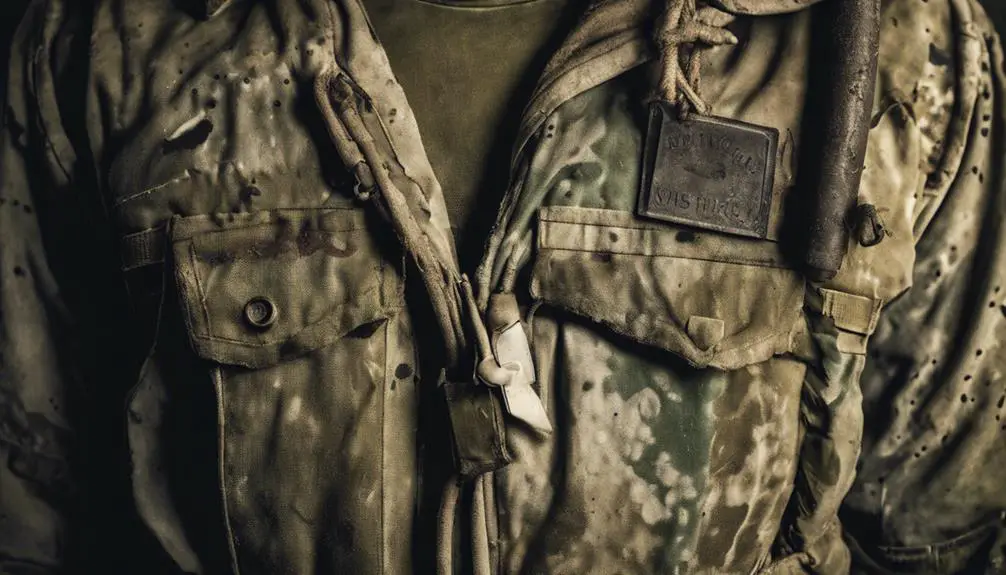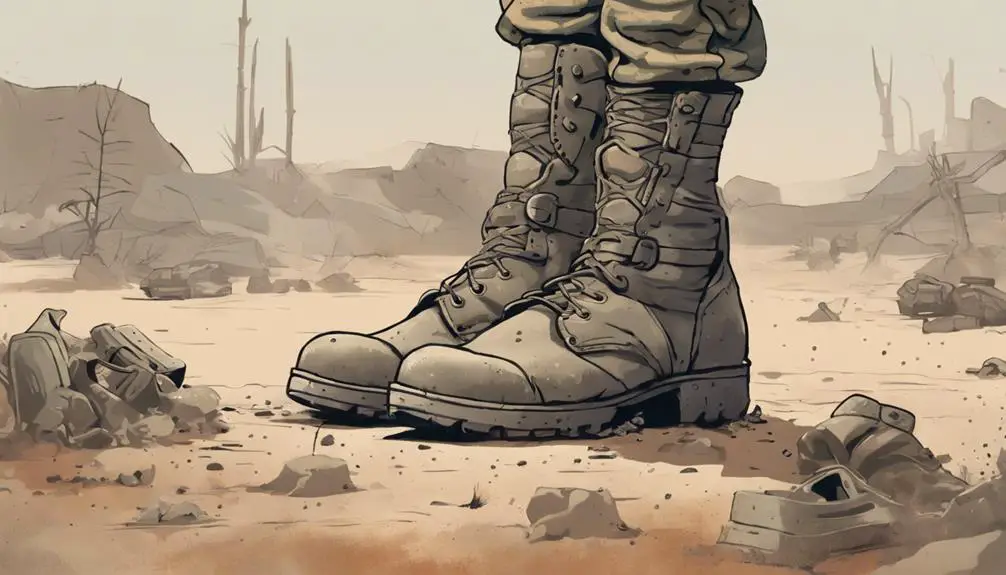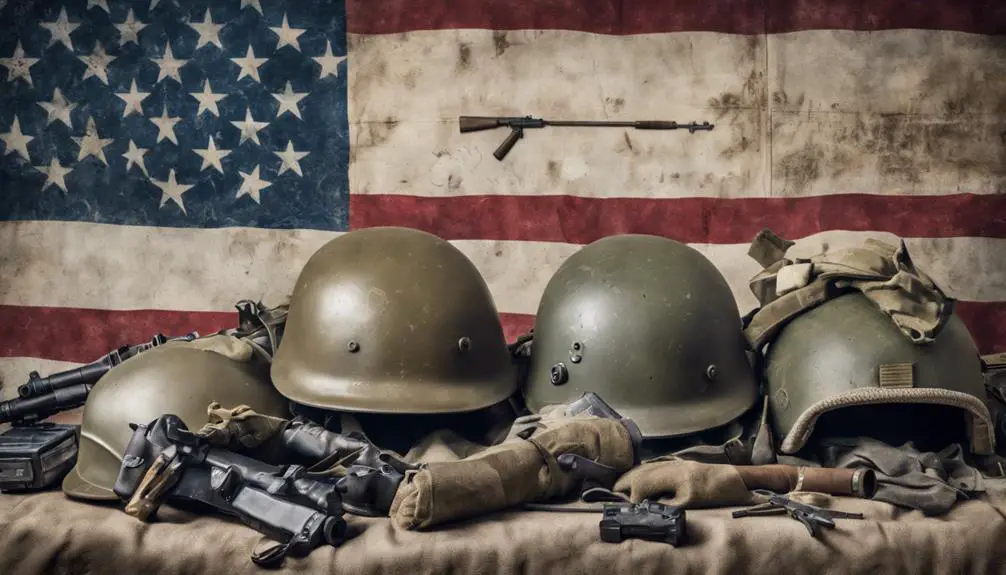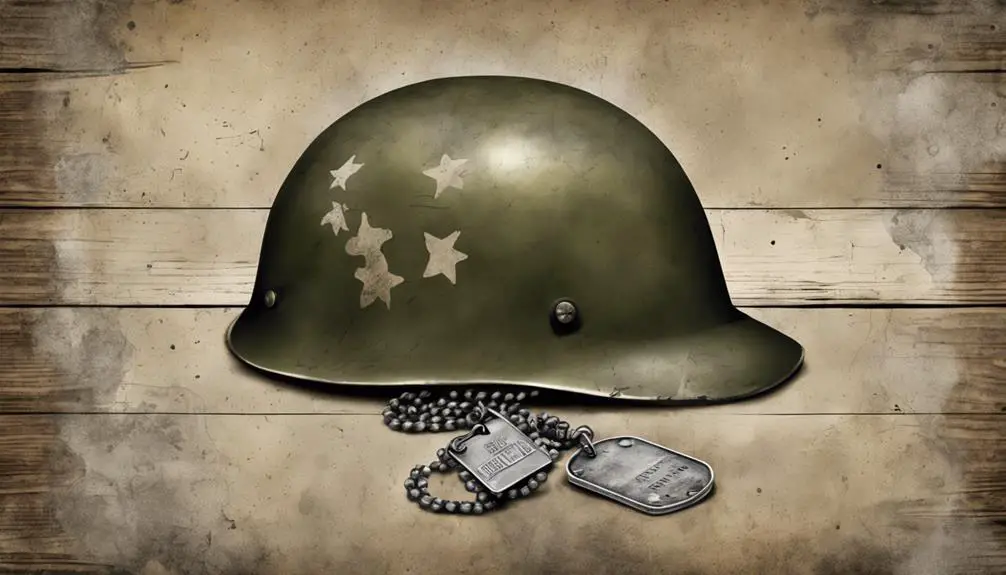You're about to experience the raw, unfiltered language of the military. 'Oscar Mike' means it's time to move out, while 'Hajji' references the enemy. Battle cries like 'Oorah!' and 'Hooah!' energize troops, and foxhole humor serves as a coping mechanism in combat. Military slang facilitates quick decisions and instinctive reactions, providing a lifeline in high-pressure situations. It's rooted in combat psychology and the warrior ethos, conveying camaraderie and emphasizing resilience. Get ready to immerse yourself in the world of military slang, where each phrase holds a story and a purpose – and there's much more to uncover.
Slang of the Battlefield Born

On the battlefield, you're more likely to hear 'Hajji' than 'enemy insurgent' or 'Oscar Mike' instead of 'moving out,' as military slang often emerges from the urgency and chaos of combat. In the heat of battle, clear communication is important, and colloquialisms can convey complex ideas quickly.
Battle cries, like 'Oorah!' or 'Hooah!', serve as a rallying cry, boosting morale and energizing troops. Foxhole humor, a coping mechanism, helps soldiers deal with the psychological strain of combat. You might hear a grunt joke about the absurdity of their situation, breaking the tension and fostering camaraderie.
In this environment, slang becomes a lifeline, facilitating quick decisions and instinctive reactions. Soldiers rely on these colloquialisms to convey complex ideas swiftly, like 'Hajji' for enemy insurgent or 'Oscar Mike' for moving out. This linguistic shorthand enables troops to respond rapidly, ensuring their survival in high-pressure situations.
Words of War and Wisdom
As you adopt the lingo of the military, you're not just speaking a language – you're tapping into a collective wisdom born from the harsh realities of combat. The Warrior Ethos, a set of principles that define a warrior's identity, is deeply ingrained in the language used by service members. Combat Psychology plays a significant role in shaping this language, as it's rooted in the psychological effects of war on the human mind.
Here are three key takeaways from the language of war:
- Resilience: Military slang often emphasizes resilience and adaptability in the face of adversity, reflecting the harsh realities of combat.
- Camaraderie: The language used by service members frequently conveys a strong sense of brotherhood and sisterhood, highlighting the bonds formed in the trenches.
- Humor: Military slang often incorporates dark humor, serving as a coping mechanism for the trauma and stress of war.
Boots on the Ground Lingo

You're about to immerse yourself in the gritty, unvarnished language of those who've faced the harsh realities of combat, where 'boots on the ground' is more than just a phrase – it's a way of life. As you explore the world of tactical terminology, you'll discover that field phrases are more than just jargon – they're an essential part of the military's communication strategy.
| Term | Meaning |
|---|---|
| Sitrep | Situation Report, providing updates on the battlefield |
| ROE | Rules of Engagement, outlining when to engage the enemy |
| EOD | Explosive Ordnance Disposal, specialized units that defuse explosives |
| LZ | Landing Zone, designated areas for aircraft to land and take off |
These phrases are not just words; they're a lifeline in the heat of battle. They convey critical information, provide clarity in chaos, and help soldiers make split-second decisions that can mean the difference between life and death. As you investigate this language, you'll gain a deeper appreciation for the men and women who've served on the front lines, and the tactical terminology that's become an integral part of their DNA.
Military Jargon Declassified
Beyond the battlefield, military jargon permeates every aspect of military life, influencing how service members communicate, think, and operate. You, as an outsider, may find it intimidating to decipher the complex web of acronyms, abbreviations, and colloquialisms that dominate military communication. However, understanding this jargon is essential to unraveling the code of military culture.
Embark on a jargon journey to uncover the intricacies of military communication. Here are a few examples that illustrate the complexity of military jargon:
- FOB: Forward Operating Base, a temporary or permanent military base
- SITREP: Situation Report, a concise summary of a military operation
- COMMS: Communications, encompassing all forms of military communication
As you explore further into the world of military jargon, you'll discover that code cracking isn't just about understanding individual terms, but also about grasping the nuances of military culture. By doing so, you'll gain a deeper appreciation for the intricacies of military communication and the people who use it.
Soldier Speak Through History

From ancient Roman centurions to modern-day special operatives, soldier speak has evolved over time, reflecting the cultural, social, and technological advancements of each era. You'll find that the language of war has been influenced by the societies that wage it.
For instance, the War Chronicles of ancient Greece reveal a distinct vocabulary born from the phalanx formations and hoplite warfare. Similarly, the Forgotten Terminology of medieval knights is peppered with French and Latin phrases, reflecting the Norman Conquest's linguistic legacy.
As you explore further into history, you'll notice that soldier speak adapts to new technologies and tactics. The trench warfare of World War I introduced terms like 'no man's land' and 'foxhole.' World War II's global scope incorporated phrases from various languages, such as 'kamikaze' (Japanese) and 'flak' (German).
The Vietnam War popularized 'grunt' for infantrymen and 'chopper' for helicopters. Today, modern military slang incorporates acronyms like 'SOF' (Special Operations Forces) and 'ISR' (Intelligence, Surveillance, and Reconnaissance). You'll find that understanding soldier speak requires a grasp of the historical context in which it emerged.
Frequently Asked Questions
What Is the Origin of the Term "Grunt" for Infantry Soldiers?
You're wondering where the term 'grunt' for infantry soldiers comes from. Historically, the origin is rooted in the battlefield origins of World War II.
In this historical context, 'grunt' referred to the sound of exertion and fatigue made by soldiers carrying heavy packs and equipment. Over time, the term stuck, symbolizing the infantry's physically demanding role on the front lines.
Are Military Slang Terms Used Universally Across Branches?
You might be surprised to know that a staggering 70% of military slang terms are branch-specific.
When it comes to military slang, you'll find that each branch has its own unique dialect. While some terms are universally understood, others are exclusive to specific branches.
For instance, the term 'grunt' is specific to the Marine Corps, whereas 'squid' is used by the Navy. This highlights that military slang terms aren't used universally across branches, but rather, each branch has its own distinct lingo.
Can Civilians Use Military Slang Without Being Offensive?
You're wondering if civilians can use military slang without being offensive. Generally, it's a good idea to exercise caution.
Appropriation concerns arise when cultural symbols or language are used without understanding or respect. Be mindful of cultural sensitivity and avoid using terms that might be sacred or meaningful to military personnel.
If you're unsure, it's best to avoid using military slang altogether to avoid unintended disrespect.
Do Military Slang Terms Change Over Time or Remain Static?
Imagine you're a linguistic detective, tasked with cracking the code of slang evolution.
As you investigate the world of military slang, you'll discover that terms don't remain static; they evolve like a living organism.
Evolution patterns show that cultural influences, like technology and pop culture, shape the language.
You'll find that slang adapts to reflect the times, incorporating new phrases and phrases while retiring outdated ones.
This dynamic process guarantees military slang remains relevant, yet authentic, to its users.
Are Military Slang Terms Used Only for Communication or Also for Camaraderie?
As you explore the purpose of military slang, you'll find it's not just about conveying information. It's also about fostering camaraderie among troops. You're part of a unique cultural identity when you use these terms, creating a sense of belonging.
Military slang serves as a bonding mechanism, setting you apart from civilians and strengthening unit cohesion. It's a subtle yet powerful way to build trust and rapport with your comrades, going beyond mere communication.
Conclusion
As you reflect on the evolution of military slang, you realize that it's more than just a language – it's a reflection of the camaraderie, humor, and resilience of those who serve.
From 'FUBAR' to 'HOOAH,' each term tells a story of its own.
Will you ever truly understand the nuances of military jargon without having boots on the ground? Perhaps not, but one thing is certain – the slang of the battlefield is a tribute to the unwavering spirit of those who serve.







